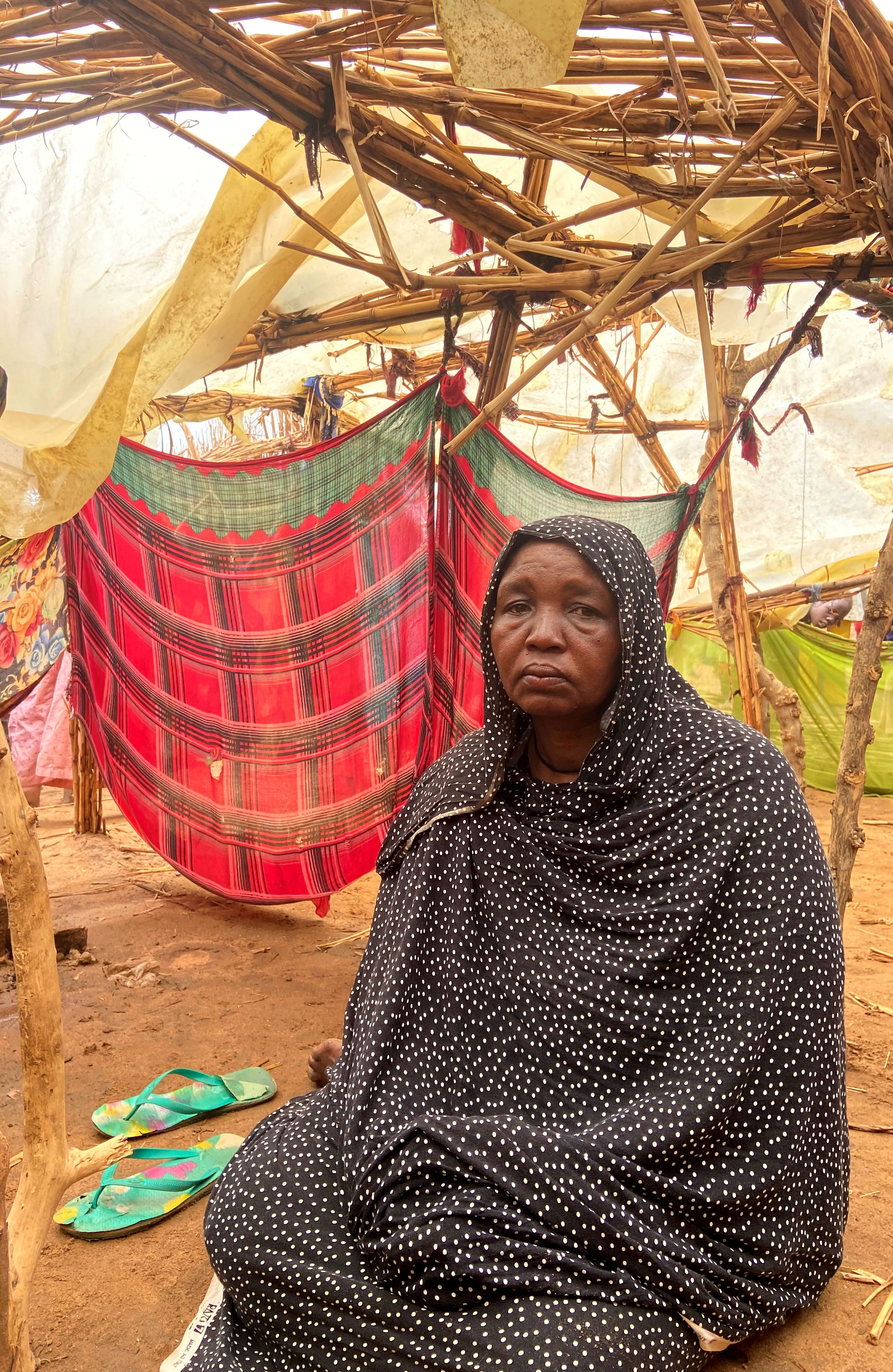
Mariama* has eight children, but she doesn’t know where four of them are.
She lost them escaping violence in el-Geneina, the capital of Sudan’s West Darfur state.
One night, she said, her family of 10 awoke to the city being set on fire and it was clear they had to leave. She and her husband grabbed their sleeping children to flee.
“We were together for a while but became separated en route amidst the chaos. I arrived at the Adre border crossing with only four of my children,” Mariama said, referring to the Chadian city on the Sudan-Chad border where more than 280,000 people have fled since Sudan’s conflict broke out 100 days ago, according to the aid group Concern Worldwide.
“I do not know what has become of my four other children and my husband,” the 55-year-old said.

Fatima* is another woman who has been separated from family after fleeing the violence in Darfur in recent weeks.
While her two children managed to reach a transit site for refugees in Chad with her, her husband disappeared into the bush as armed men approached them.
“I’ve been [at the site] ever since, and I have no news on what has become of my husband,” she said.

Fatima, Mariama and thousands of others like them are bearing the brunt of the deadly conflict between Sudan’s army and the paramilitary Rapid Support Forces (RSF). And humanitarian workers have been pushed to the limit since fighting broke out on April 15 as they struggle to respond to the country’s multifaceted crisis.
Reka Sztopa, Concern Worldwide’s regional director for West Africa and the Sahel, said hundreds of people are continuing to cross into Chad from Darfur each day as the conflict shows no signs of abating. Darfur has experienced some of the most harrowing atrocities of the conflict with reports of mass graves, executions and villages burned to the ground.
“More than 30,000 people have registered at this border camp with more arriving each day,” Sztopa told Al Jazeera, referring to the Chad transit site 1.5km (nearly a mile) from the Sudan-Chad border, where she met Mariama and Fatima.
‘No improvement’
According to Elsadig Elnour, Islamic Relief’s Sudan country director, the misery of the past 100 days has done little to change the situation on the ground.
“I don’t see any improvement in Sudan,” he told Al Jazeera.
About 3.3 million people have fled their homes due to the conflict. Some have become refugees in neighbouring countries like Chad and Egypt while others have been internally displaced to relatively safe places such as the east-central state of el-Gezira and the coastal city of Port Sudan.
“There is no access to all international NGOs to reach the beneficiaries as there are no safe routes,” Elnour said of the situation in the capital, Khartoum, a hotbed of violence. Elnour explained that Islamic Relief’s offices were relocated to el-Gezira, south of the capital, early in the conflict.
Concern Worldwide’s Sudan country director, AKM Musha, said the lack of safe routes is affecting all aid work.
“Humanitarian organizations are facing barriers to assist people in need,” Musha told Al Jazeera. “Humanitarian responders need security in order to work. We need to be able to bring specialist staff into the country quickly, and we need to be able to move supplies.”

States receiving people fleeing the capital are increasingly overwhelmed and are running out of food, water, medicine and other critical supplies, Elnour said.
Rents have skyrocketed in these places, compelling some to want to return to Khartoum despite the security situation there, he said. Islamic Relief has responded by providing cash and food aid to families in states such as el-Gezira and Gedarif, the humanitarian worker explained.
The organisation has also provided vulnerable farmers with seeds to grow crops to support the influx of people arriving in the safer states.
But in places like Darfur, the organisation has entirely suspended operations as harrowing violence and a communications blackout continue to grip the western region.
Not another 100 days
Concern Worldwide has also been unable to operate in Darfur.
“Currently the roads are not safe to enable us to move supplies from Port Sudan across the country to Darfur – a journey of over 1,367 miles [2,200km],” Musha said.
The organisation, like many others, is able to support those from Dafur only once they arrive in Adre as Fatima and Mariama managed to do.
“Many people are arriving in poor condition – exhausted, traumatised and some with injuries, including bullet wounds,” Audrey Hernandez, Concern’s Chad country director, told Al Jazeera. “They are arriving with very little either because they fled so quickly, because their belongings were burnt or looted, or because they have had to trade items to negotiate their way to the border.”
Concern Worldwide says it has responded to the influx with a mobile health and nutrition clinic in a transit camp along the border and has treated close to 1,200 patients since the start of the conflict for illnesses that include acute respiratory ailments, malaria and diarrhoea.
The organisation is supporting the construction of shelters at the transit sites and providing supplies to those who arrive with items ranging from sleeping mats and mosquito nets to reusable menstrual hygiene pads.
But many organisations, including Concern, have reported looting at their facilities in the past few months, Musha said, which has only contributed to supplies being exhausted within the country.
“It is no exaggeration to say we are facing a humanitarian catastrophe,” Musha said. “Nobody knows how this will pan out or where it is heading.”

*Names have been changed to protect identities







